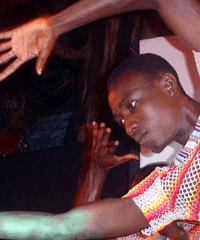









Alex Smith
Amanze Akpuda
Amatoritsero Ede
Amitabh Mitra
Ando Yeva
Andrew Martin
Aryan Kaganof
Ben Williams
Bongani Madondo
Chielozona Eze
Chris Mann
Chukwu Eke
Chuma Nwokolo
Colleen Higgs
Colleen C. Cousins
Don Mattera
Elizabeth Pienaar
Elleke Boehmer
Emilia Ilieva
Fred Khumalo
Janice Golding
Lauri Kubuitsile
Lebogang Mashile
Manu Herbstein
Mark Espin
Molara Wood
Napo Masheane
Nduka Otiono
Nnorom Azuonye
Ola Awonubi
Petina Gappah
Sam Duerden
Sky Omoniyi
Toni Kan
Uzor M. Uzoatu
Valerie Tagwira
Vamba Sherif
Wumi Raji
Zukiswa Wanner
![]()
Credits:
Ntone Edjabe
Rudolf
Okonkwo
Tolu
Ogunlesi
Yomi
Ola
Molara Wood
![]()
 |
|||||
The simple life – what we dream about but never quite have at African Writing. Life and its complex ambiguities – that is more the common fare of our editorial interests at African Writing. In Issue No. 2, in which we focused on African writing in Britain, there was the challenge of interpreting and making the term “Black British” relevant to our interests. You couldn’t choose a more suitable location than South Africa for a sequel on writing from the fractured and contested identities of contemporary Africa.
Photo: Tolu Ogunlesi |
|||||
| Welcome | |||||
|
Welcome indeed to our South African special issue. It is also a bumper holiday issue, so we nod our season’s greetings with vacation photographs from the poet Tolu Ogunlesi. Writer and journalist Molara Wood advances this end-of-year mood, bringing her now familiar annual survey of favourite readings by African writers to this issue of African Writing. Wood’s ‘Books of the Year’ is usually an authoritative sample of what a fair proportion of African writers have read in the given year. From Rudolph Okonkwo, in our new photo gallery, we have an engaging offering of conference photographs from the recently concluded Christopher Okigbo International Conference in the US. But it is to South Africa we must go for most of our features this issue. Special thanks to Chimurenga Editor Ntone Edjabe, Ben Williams of Book SA Daily, the supremely resourceful Victor Dlamini, Mark Espin of Centre for the Book, publisher Rose Francis, poets Chris Mann and Lebo Mashile, novelists Zukiswa Wanner and Alex Smith, National English Language Museum researcher Andrew Martin, and others, for believing in our project and offering their time, resources and other invaluable assistance in what was mostly a labour of love – this special South African issue of African Writing. Special thanks yet again to Zukiswa Wanner and Alex Smith for their representative AW profile of women writers in South Africa, involving some research and many interviews. Thanks to publishers Umuzi and African Perspectives for access to some of the writers. Not long ago, Chimurenga had its special Nigerian issue, ‘We Are All Nigerians!’ In this special South African issue of AW, you could be forgiven for thinking all of African literature now happens in South Africa. So impressive has been the development and excellence of its post-apartheid writing. Yes – We are all South Africans now! In addition to the many interesting contributors form South Africa, this issue is significantly empowered by Ghanaian writer Manu Herbstein’s special investigative report on the British Council’s 2007 slavery abolition anniversary events in his country. Herbstein is the author of Ama: A Story of the Atlantic Slave Trade, a critically acclaimed novel. We are also paying tribute in this issue to the literary lives of four African writers – the Nigerians Idzia Ahmad and Cyprian Ekwensi, both now departed, South African poet and senior literary figure Don Mattera and the Kenyan novelist Ngugi wa Thiong’o, who is 70 years, January 2008. Special thanks to Amanze Akpuda, Uzor Maxim Uzoatu and Emilia Ilieva, for their labour on the tributes. Please locate the AW Issue Nos. 1 and 2, included in our archives. The second issue profile especially offers an extensive and frequently challenging range of contributors to the making and development of African writing in Britain. In African Writing, we are constantly
reviewing the services we offer our readers to identify possibilities
for improvement and growth. Reader reactions and letters are useful
ways by which we access our progress. Please find the time to respond
to the Readership
Survey,
which is one of our new online features. For on-going concerns and
extended reactions to Another new feature in The Editor
|
|||||

